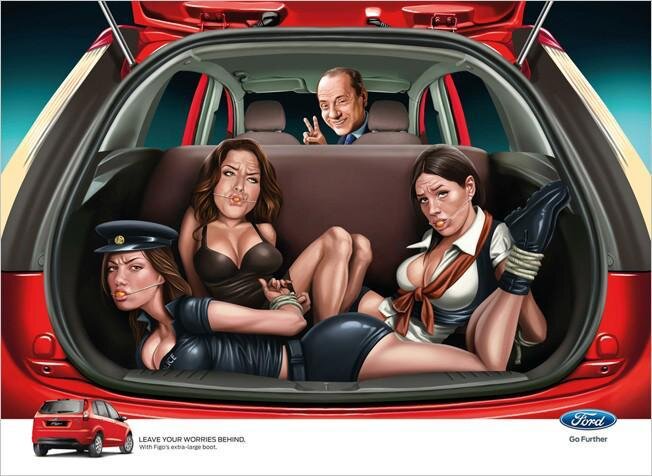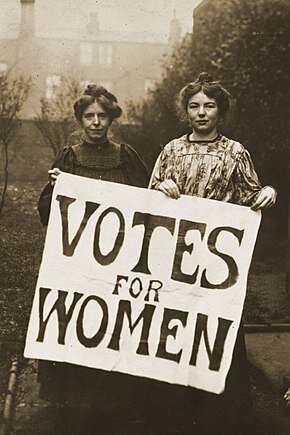I Want To Talk To You About Sexism
Sexism is prejudice, stereotyping, or discrimination, on the basis of sex. It can affect anyone, but it mainly affects women and girls. It can be an act, a word, a joke, a gesture, an image, and it is harmful because it makes people feel worthlessness, but most importantly - sexism lies at the root of gender inequality.
Sexism exists everywhere, in movies, the media, ads, in fashion, the work place, in the language we use, in the arts, politics, education and so much more. It's like a form of brainwashing that surrounds us from childhood with boys being encouraged to be brave, adventurous and active, while girls are encouraged to behave like ladies, be pleasant and pleasing. It relies on the notion that women and men are opposites, with very different qualities and roles to play in society: women are the weaker sex therefore less capable than men, especially when it comes to physical jobs that are often seen as "hard work" or leadership roles in industries that make a lot of money and therefore must be very 'important".
Women have been labeled as more domestic and emotional and, therefore, cannot possibly be good at business or politics, and although as women we do an amazing job at whatever it is that we do, our roles are devalued or not valued at all when compared with important men’s work. So that's basically sexism in a nutshell.
You may have heard the term 'casual sexism' or 'everyday sexism' and wondered what that is, so just to be clear, casual sexism is basically sexism, the only thing 'casual' about it is that it's so well blended in with our everyday lives that we don't even see it. Most of us know that a picture of a half naked woman bent over a car with someone smacking her butt is a sexist image, but casual sexism is when it's seemingly "harmless" because well... it's been normalised.
Examples include:
Addressing everyone in the room as “guys” even though the gathering includes women - we are all guilty of doing that, including me. Making comments like “you throw like a girl”, or “grow a pair” or making it sound like girl stuff is kinda rubbish (Toy story clip - I'm not a girls toy) Using terms like ‘mankind’, ‘man-made’, ‘the common man’, ‘manning a place’, which are terms that are widely used, and all contribute to a sexist culture. Bosses or customers calling women “good girl”, “sweetie”, “baby” or referring to an assertive woman as a "bitch", while men with the same characteristics are referred to as leaders.
Describing girls as tomboys. Seeing a woman who focuses on her career as selfish while a man in the same position is called driven. Asking a woman how she juggles work and family life while never asking men the same question. Being asked about being unmarried or childless. Focusing on a woman's body and looks instead of her achievements,.
Asking the only woman in the room to take notes in a meeting or make coffee, asking a woman where her kids are or if her husband is 'babysitting them'? assuming a man makes more money than his wife, asking a woman if she needs to discuss it over with her husband when she makes a big purchase, in movies women are nurses while men are doctors, women wearing heels even when being chased by dinosaurs or how female superheroes always have great hair and a very big cleavage, every time a woman enters the screen in slow motion in films, and basically every time women are looked at through a male gaze on screen.
Every time male characters have more time screen in movies, better roles, more lines, better lines, higher salaries, even as cartoons, jokes about women being bad drivers, bad at DIY, bad at comedy, speaking about professionals such as engineers or scientists using the pronoun 'he', telling a woman she would look prettier if she only 'smiled', referring to grown ass women as 'girls' while men are men, not boys. Every time the words good girls were ever mattered on screen.
Women doing more of the household-work and child care, even in families where both parents work full time and earn the same salary. Calling a woman emotional when she points out sexism, telling a woman she should 'lighten up' when she demands to be treated with respect, telling women 'they can't take a joke' when the joke is not funny, asking women if it's that time of the month, catcalling on the street and every time a man 'mansplains' anything.
The list goes on and on and I bet you have your own examples, feel free to add them in the comments, but the point is these are everyday things that happen all the time. As mentioned sexism does not only affect women, it harms men too. By shaming men for being sensitive, saying they are not man enough if they show their emotions, making fun of them if they are the primary carers of their children, or if they earn less than their wives etc... but if you look at those examples, you see that the base of them is still the same thing. And that is what hides underneath sexism... What does it serve? Have you ever wondered, why our society is so sexist in the first place?
I will tell you why.
Sexism's main function is to maintain patriarchy.
Patriarchy for those who don't know the term, is a system or society in which men hold the power. Sexist ideology helps maintain Patriarchy by oppressing women and girls on the basis of sex or gender. Now this is usually the point where some people feel under attack, hashtag not all men, and some people lose the plot a little, but this is not an attack, or an opinion, this is a fact, that is based on events and history.
Sadly there are still people who deny there is any gender inequality, who play down sexism as a bit of banter, who potentially do not want the status quo to change because maybe - it serves them. The facts are that women only got the right to vote for example in different countries around the world in the last 200 years. This says so much about women's starting point in our society.
Women were, and in some places around the world still are, second class citizens not allowed to use the most fundamental tool in any democracy. That's how oppressed we were. And many rights (like the right to vote, to work, to wear trousers, to drive a car etc) that women didn't have automatically like men, were not given to us by those in power. They either happened because they were a necessity like during wars, OR we had to fight for them.
We cannot ignore history when we talk about gender inequality. Because it says a lot about the system we are operating in today, which is still very much patriarchal with many more hurdles to overcome on our way to full equality.
Now, sexism is a tool that slows this process down which is why it's so important to identify it, and call it out, whenever we see it, no matter how small or seemingly harmless it may look.
Because the extreme form of sexist ideology is misogyny, which is hatred of women. And in a society where misogyny plays a big role you will find a high rate of domestic violence, rape, victim blaming, and objectification of women's bodies.
A lot of which we are seeing already and not just in some corners of the world, but everywhere, even in our own backyards. Gender inequality and sexism are real, and those who feel uncomfortable, under attack, or even that the conversation a bit of a drag, or boring, or maybe even a burden, might want to consider the possibility that the reason they feel that way is because they have spent their entire lives enjoying privileges that come with being born male in a patriarchal society.
There has been so much research done on this topic, many articles and books written about it, it's impossible to say everything in one go, but I personally agree with the opinion that one of the ways to achieve gender equality is by changing sexist culture.
There is such a strong connection between the two things, but the good news is that there are things we can do to change it! For one, we can do more to proactively stop reinforcing the patriarchal rules starting by making small but very significant changes like changing the language we use every day.
We can check ourselves in how we are raise our kids, what words we use to describe them, what expectations we have from them based on their sex?
We can be more selective in what we allow our children to watch on TV, sadly sexism can be found even in cartoons! (videos of cartoons) But most importantly, we can explain to them what sexism is so that they can identify it and call it out themselves. We can become more aware, and make others more aware of gender stereotypes. As women, we can be more vocal about sexism, call out wherever we see it, and find male allies who are willing to make the same efforts.
Because I'll tell you something - a sexist society is not a good thing. It does not allow all its members to thrive, it does not encourage people to be themselves, in fact - it encourages an environment of violence and repression, it damages our relationships, and it is even bad for our economy.
We should be prepared for the fact that getting rid of sexist beliefs and habits is not going to happen over night. We have all been brainwashed to believe these stereotypes, ways of saying things, what is considered funny, to be true and it's going to take time to dismantle that, but it's so worth doing.
Starting right now.








